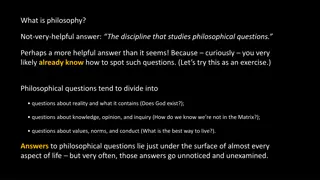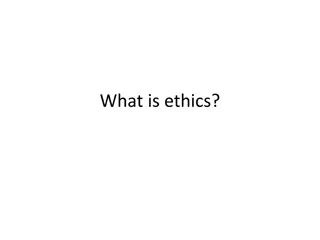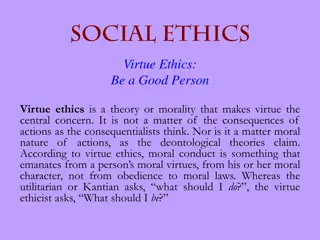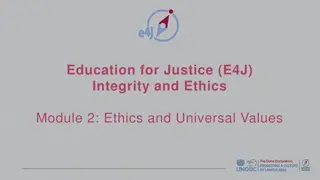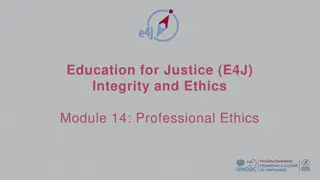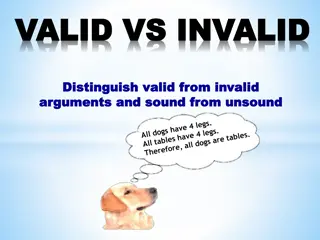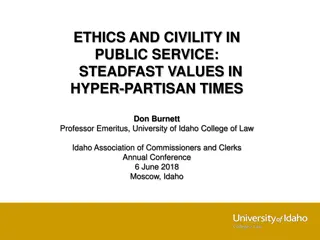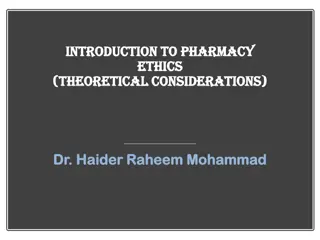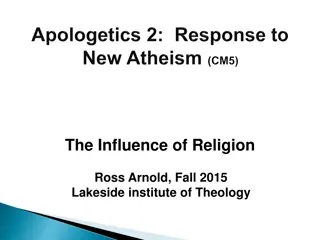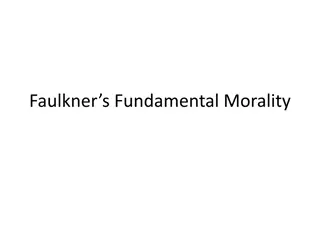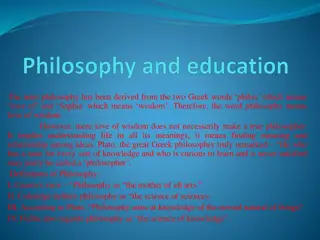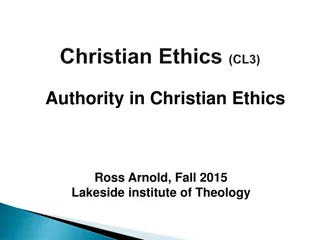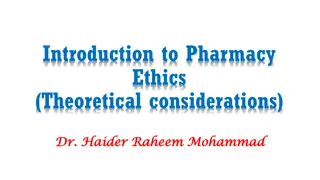Understanding Morality, Ethics, and Arguments in Philosophy
Morality and ethics are interconnected concepts that delve into the principles of right and wrong conduct. They involve disciplined reflection on human moral intuitions and choices. Valid and invalid moral arguments exemplify the importance of drawing evaluative conclusions from facts. Various ethical principles, such as autonomy, beneficence, and justice, guide moral reasoning and decision-making.
Download Presentation

Please find below an Image/Link to download the presentation.
The content on the website is provided AS IS for your information and personal use only. It may not be sold, licensed, or shared on other websites without obtaining consent from the author. Download presentation by click this link. If you encounter any issues during the download, it is possible that the publisher has removed the file from their server.
E N D
Presentation Transcript
Ethics and Morals are intertwined Ethics - a branch of philosophy that involves systematizing, defending and recommending concepts of right and wrong conduct. Ethics Disciplined reflection and analysis on the moral intuitions and choices that people make. Morality The science of human duty; the rules of human conduct. The rules and principles are typically authoritative, prescriptive and universalizable.
Morality Beauchamp Function is To combat the deleterious consequences of human sympathies (tendencies). Warnock - Aim is to contribute to the betterment (or non-deterioration) of the human predicament. Moore Ethics aims at discovering the properties belonging to all things that are good.
Invalid Moral Argument 1) A fetus has a brain wave after 25 weeks of gestation. (fact or premise) 2) A conscious adult has a brain wave. (fact or premise) Therefore: Killing a fetus after 25 weeks is as wrong as killing a conscious adult. (evaluative) You jumped the Fact-Value gap You drew evaluative conclusion from facts.
Valid Moral Argument 1) A human fetus has a brain wave after 25 weeks of gestation. (fact or premise) 2) A human with a brain wave is a person. (connecting fact-value premise) 3) Killing a person is morally wrong. (evaluative premise) Therefore, killing a fetus with a brain wave is morally wrong. (evaluative)
Principles to Consider Autonomy Principle of respect for one s ability and right to make decisions on one s own behalf. The right to self-determination. Beneficence Principle of helping others achieve their important interests, either by respecting their autonomy or what we see as in their best interests (paternalism). Do the right thing. Fidelity Keep your promises. Keep confidentiality.
Principles - continued Justice One has acted justly when one has given another what they are due. Similar cases should be treated similarly. Distributive Justice just distribution of social benefits and burdens Nonmaleficence Refrain from harming others. Can be applied to society as well. Veracity Honest is the best policy
Are You Consequentialist What should be done is determined by anticipated consequences or historical precedent. Motives and intentions are not relevant. No act, in and of itself, is moral. Deontologist (Kantian ethics) Ethics is a matter of duty, not consequences. An act must be done from the right motive (which is to do one s moral duty) and done freely. Humans should always be treated as ends , not means to an end . Utilitarian An act is right if it produces the greatest good for the greatest numbers. The act leads to good consequences (pleasure or preference).
A Utilitarians Essence Consequentialism Consequences count, not motives or intentions. The Maximization Principle The number of people affected by consequences matters; the more people, the more important the effect. A Theory of Value (or Good ) Good consequences are defined by pleasure or what people prefer. Scope-of-Morality Premise Each being s happiness counts as one .



